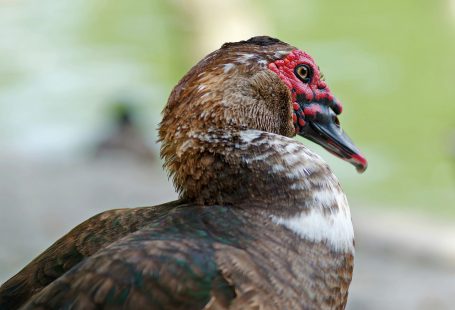Domesticated ducks are derived from wild mallards (Anas platyrhynchos -type) and Muscovy ducks (Cairina-type). Some breeds are specifically designed for egg production, others for meat production, and still others are ornamental. They range widely in size, shape, and color. Some lay white eggs, others brown, and still others rainbow colors. However, regardless of the breed(s) of ducks you may own, their basic needs are the same: a good quality diet, protection from the elements and predators, and a clean environment.
HEALTHY DIETS FOR DUCKS
Good nutrition is crucial to keeping your ducks healthy. All ducks should be fed a crumbled or pelleted diet formulated to meet their nutritional needs. Follow the guidelines below to find the right food for your duck. It is preferable to feed a diet created specifically for waterfowl, such as Mazuri feeds (made by Purina). If your local feed store doesn’t carry this brand, ask them to order it for you. Alternately, you can feed a non-medicated pellet designed for chickens or parrots.
Ducklings and adolescent ducks: Young ducklings grow very quickly and need food that is high in protein and calories. For the first 3 weeks of life, feed a starter diet that is 18-20 per cent protein. Make sure the pellets are small enough for ducklings to eat (about 1/8″). From the fourth through the 13th week, switch to a maintenance diet with 14 per cent protein. After the 14th week, females should be switched onto a laying diet (See below).
Drakes and non-laying ducks: Drakes and ducks that are not producing eggs should be fed a maintenance diet that is 14 per cent protein. While a laying ration is critical to the health of laying ducks, this diet is too high in calcium and protein for non-laying ducks. Switch your ducks to a maintenance diet when they stop laying eggs (usually in the fall).
Laying ducks: Due to the large number of eggs they can produce (many more than wild birds do), laying ducks have very high requirements for calcium and protein, and must be fed a layer or breeder diet. Laying diets for ducks are typically 16-17 per cent protein and higher in calcium than are maintenance diets.
Treats: Treats should be given in small amounts. Although many ducks love foods like corn, carrots, and greens, these foods do not meet all of your ducks’ nutritional needs, and should compromise no more than 5-10 per cent of the diet. Allowing your duck to graze in your yard is fine providing that your yard is pesticide-free.
Grit: Ducks that have access to dirt will pick up small stones on their own and don’t need supplemental grit offered. If your ducks are kept in enclosures without access to dirt, sprinkle a small amount of grit on their food once a week.
Oyster Shell: Oyster shell is not usually necessary if your laying ducks are on a good quality-laying ration. If despite a good diet your ducks are laying pitted or thin-shelled eggs, you may choose to supplement the laying diet with crushed oyster shell.
What not to feed: Do not offer medicated feeds designed for other species, as these can be toxic to ducks. Do not feed oyster shell to non-laying ducks or to drakes, as this can lead to kidney disease. Do not feed moldy or insect-ridden foods (see below).
FEEDING YOUR DUCKS: Buying and Storing Food
To ensure you ducks receive the best diet possible, buy small quantities of a fresh, high quality feed on a regular basis. Unless you have a large flock, avoid buying very large (50 lb.) bags of food; vitamins degrade with storage, and you are better off buying smaller quantities more frequently. Note the expiration date on the food you purchase, and do not feed after that date. Be wary of unknown brands; to insure that you are purchasing a quality product, stick with a reputable manufacturer such as Purina, Mazuri, or Gunter.
It is important to store your ducks’ food in a tightly sealed plastic can that is kept in a cool, dry location. Avoid storing food in metal containers, as metal “sweats” and can lead to the growth of toxic molds. Protect the food from light and heat, as these can cause rapid breakdown of vitamins that are crucial to your ducks’ health. Insects and rodents carry bacteria and parasites that can make your birds sick, and should not be allowed to come in to contact with your ducks’ food. Discard any food that is moldy, moist, or old. If there is any question about the freshness of your ducks food, remember this basic rule of thumb; when in doubt, throw it out.
Ducks should get plenty of fresh feed daily. Extra feed should be disposed of daily, especially in wet or humid weather. Many ducks like to dip their pellets in water while eating, and should have a bowl of fresh water nearby.






